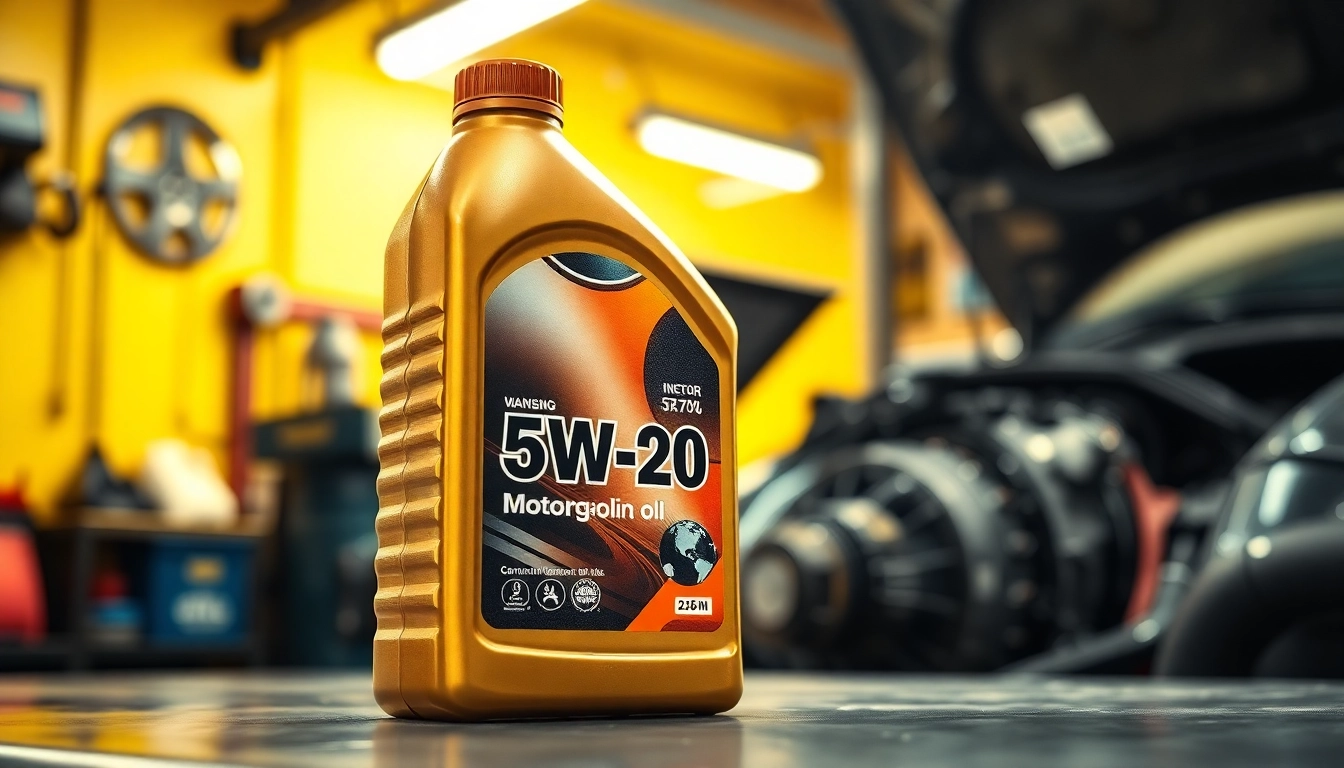The Essential Guide to Oil 5W-20: Benefits, Performance, and Selection Tips
Understanding Oil 5W-20
What is Oil 5W-20?
Oil 5W-20 is a multi-viscosity motor oil that’s designed to provide optimal engine lubrication and protection under various temperature conditions. The “5W” signifies the oil’s low-temperature viscosity rating, meaning it flows easily at cold temperatures, while “20” denotes its high-temperature viscosity, suggesting it maintains thicker properties when the engine reaches operating temperature. This dual functionality makes oil 5W-20 suitable for a wide range of vehicles, promoting efficient engine performance while helping to reduce wear.
Viscosity Ratings Explained
Viscosity ratings are crucial for determining how well engine oil performs under specific conditions. The Society of Automotive Engineers (SAE) assigns these ratings, which reflect an oil’s flow characteristics. For example, the “W” in 5W-20 stands for winter, indicating how the oil performs in cold temperatures. The number preceding the “W” indicates how it behaves in colder environments—lower numbers signify better flow in cold weather. Conversely, the second number (20) indicates the oil’s viscosity at high temperatures. The closer this number is to 30, 40, or higher, the thicker the oil remains at operating temperatures, providing enhanced protection against engine wear, friction, and heat.
Applications and Compatibility
Oil 5W-20 is commonly used in modern passenger vehicles, particularly light trucks and SUVs that require lower viscosity oils for fuel efficiency. Typical applications include many popular models from manufacturers like Ford, Honda, and Toyota. Additionally, its compatibility with both conventional and synthetic formulations expands its utility, allowing users to choose based on preferences or performance goals. It’s important for vehicle owners to consult their owner’s manual for specific recommendations regarding oil type and viscosity.
Benefits of Using Oil 5W-20
Fuel Efficiency and Performance
One of the primary benefits of using oil 5W-20 is its ability to improve fuel efficiency. Because it flows easily at lower temperatures, less energy is needed to circulate the oil through the engine. This can result in higher miles per gallon (MPG) and overall better fuel economy, which is essential for cost-effective driving in today’s market. Moreover, enhanced fuel efficiency translates to fewer emissions, positioning 5W-20 oil as an environmentally-friendly choice.
Engine Protection Features
Engine protection is a critical concern for vehicle owners. 5W-20 oil provides excellent protection against wear and tear, which is particularly beneficial during the critical winter months when the engine is cold-started frequently. The oil’s formulation helps mitigate friction between engine components, reducing wear and prolonging engine life. Additionally, modern formulations often contain additives that protect against sludge and deposits, ensuring that the engine remains clean and operates efficiently. This proactive approach to engine maintenance can lead to long-term cost savings by reducing the likelihood of expensive repairs.
Longevity of Engine Components
Using the correct viscosity oil, such as 5W-20, contributes to the longevity of several critical engine components. The oil acts as a lubricant, minimizing contact between moving parts, which can wear down engine materials over time. By helping to maintain optimal operating temperatures and reducing friction, 5W-20 motor oil ensures components such as pistons, bearings, and camshafts experience less wear. This results in a more reliable engine that can withstand the test of time, thereby enhancing the vehicle’s overall reliability.
Choosing the Right Oil 5W-20
Types: Synthetic vs. Conventional
When selecting oil 5W-20, drivers often face a choice between synthetic and conventional oil types. Synthetic oils are engineered with advanced technologies that often provide superior performance due to their ability to resist temperature extremes, oxidation, and breakdown. For example, synthetic oils maintain viscosity better over extended oil change intervals, especially under high-stress situations, making them an excellent choice for performance-oriented vehicles. Conventional oils, while often less expensive, can offer adequate protection for engines that do not operate under severe conditions, making them suitable for everyday usage in standard vehicles.
Brand Comparisons and Reviews
Several brands produce high-quality 5W-20 motor oil, each with unique benefits. For instance, Mobil 1’s synthetic offering often receives accolades for its ability to maintain performance over long intervals, making it a favorite among drivers seeking longevity. Valvoline’s products, on the other hand, are well-recognized for their high mileage formulations, which are tailored for vehicles that have seen considerable engine wear.
It’s important to note customer reviews and ratings, such as those found on websites like oil 5W-20 specialists, automotive retailers, and popular e-commerce platforms. Conducting thorough research can aid in selecting a brand best suited for your vehicle’s needs.
Price Considerations
The price of 5W-20 oil can vary significantly depending on the type (synthetic vs. conventional), the brand, and the retailer. Generally, synthetic oils tend to fall on the pricier side, often reflecting their advanced formulation and longer-lasting properties. However, many drivers view this as a worthwhile investment given the potential for decreased engine wear and improved efficiency. On the other hand, conventional oils may provide a budget-friendly option for drivers in less demanding environments. Evaluating total cost of ownership, including expected mileage and performance levels, is key when considering investment in motor oil.
Changing Oil: Best Practices
When to Change Oil 5W-20
Changing oil on a regular basis is imperative for maintaining engine health. For 5W-20 oil, most manufacturers recommend changing the oil every 5,000 to 7,500 miles when using synthetic oil. Conventional oils might require changes more frequently, around every 3,000 to 5,000 miles, depending on driving conditions. Factors such as severe weather conditions, driving style (like frequent stop-and-go traffic), and the vehicle’s age can also necessitate more frequent changes. Keeping to a schedule based on the manufacturer’s guidelines and regular maintenance checks ensures vehicles run optimally.
How to Properly Dispose of Old Oil
Proper disposal of old motor oil is crucial for environmental safety. Many local auto parts stores and service centers offer recycling programs where used oil can be dropped off for safe disposal. It’s important never to pour used oil down the drain or into the ground, as it can contaminate water supplies and harm wildlife. Always storing used oil in a sealed container until it can be disposed of correctly is best practice.
Understanding Oil Change Intervals
Oil change intervals are vital for maintaining engine performance and longevity. Apart from adhering to manufacturer recommendations, by monitoring oil levels and quality regularly—through dipstick checks and noticing any unusual changes in oil color or texture—drivers can identify when an oil change is necessary, even if it hasn’t reached the prescribed mileage yet. Additionally, tools like oil life monitors in some vehicles can provide real-time assessments to guide oil change timing.
Common Questions and Myths
Can Oil 5W-20 be Mixed with Other Oils?
Mixing oil types is often a point of confusion for drivers. The answer is yes; you can mix 5W-20 with other oils, including other viscosities, provided they meet similar specifications. However, mixing types—like synthetic with conventional—may dilute the advantages of synthetic oils, which can limit performance benefits. It’s best to avoid mixing unless absolutely necessary and aim for one type to maintain consistency in lubrication performance.
How Long Does Oil 5W-20 Last?
Many 5W-20 synthetic oils can last as long as 10,000 to 15,000 miles between changes if used in optimal conditions. This advantage stems largely from the superior additives used in synthetic oils, which help resist deterioration. Conversely, conventional 5W-20 oils typically require changing after 3,000 to 5,000 miles but checking the owner’s manual or vehicle maintenance guidelines is essential to determine your specific oil’s longevity.
Are There Any Risks in Using 5W-20 Oil?
While 5W-20 oil is a popular and widely recommended option, risks can arise from using it incorrectly. One notable risk comes from using 5W-20 in vehicles not designed for this oil viscosity, which can result in inadequate lubrication and potential engine damage. Additionally, using oil beyond its change interval can lead to increased deposits and reduced engine efficiency. Therefore, always ensuring the correct viscosity is used according to the owner’s manual minimizes those risks.












Post Comment